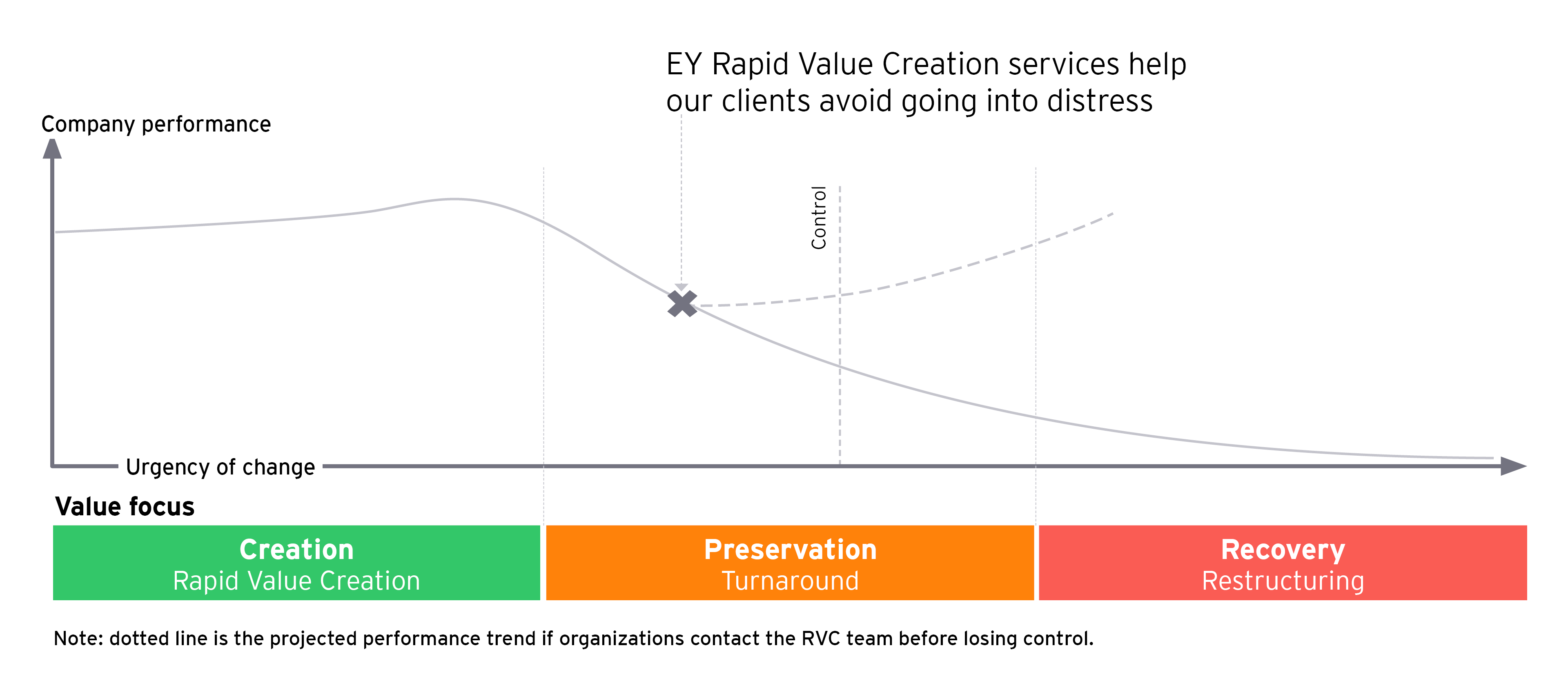Rapid value creation services
In virtually all industries today, companies are determining the best path to navigate the COVID-19 pandemic, geopolitical uncertainty and sector disruptions. Time is of the essence. Business leaders must consider and implement immediate actions to rapidly improve performance.
What EY can do for you
Most businesses are likely to experience operational challenges and / or underperformance at some point. While the root causes can be buried below the surface, the negative impact can be highly visible — profit warnings, declining performance metrics, failure to achieve project milestones, loss of customer contracts or management departures.
Whether a business is faced with a challenge, in crisis or simply needs to quickly turnaround to address an opportunity, we help management teams identify the issues, stabilize the business and rapidly provide tangible results.
We dive into the issues across operations, market, capital and the full range of stakeholders, and deploy financial and operational professionals to improve cash flow, enhance shareholder value and provide a sustainable growth platform.
We can help you identify and capitalize on value creation opportunities in all areas of your business through quick scan diagnostics and leading practices, including:
- Operating model redesign
- Identification of synergies
- Footprint optimization
- Organizational and financial restructuring
- Rapid cash release and enterprise cost reduction
- Data analytics
- Sales force alignment
- Centralization of key functions or processes
Operational diagnostics, including:
- Selling, general and administrative (SG&A) cost reduction
- Liquidity and working capital optimization
- Supply chain and sourcing effectiveness
- IT effectiveness
- Tax efficiency
Support of breakthrough improvements: we work with your teams to make your operational strategies a reality and provide lasting value.
Our team brings you:
- Insightful operational and sector experience
- Analytical tools to help establish fast facts about performance
- A practical, hands-on approach
- Financial background, bringing rigor to decision-making
- Deep experience of working quickly in an uncertain environment
- Client-tailored services

Creation |
Preservation Turnaround |
Recovery Restructuring |
|
|---|---|---|---|
Indicators |
|
|
|
EY value proposition
- Proven track record of maximizing value and performance improvement
- Hands-on support from seasoned professionals, including interim management and contract research organization services
- A “future-back” perspective, incorporating a customer impact and investor lens
- Broad, integrated offering with full suite of industry, functional and operational capabilities
- Pragmatic and sustainable answers, not “slash and burn” strategies
- Promotion of a collaborative methodology to identify real opportunities with a focus on long-term value creation
Addressing your cost and capital needs today to fund your future for tomorrow
SG&A and operations
Where can I streamline my business operations to be more cost efficient and resilient to fluctuations in revenues?
- Operating model: Only 35% of large companies say they are making good progress in their digital transformations.
- Labor productivity: 70% of organizations believe that productivity is a concern with remote working.
- Third-party spend: 50% of Fortune 100 companies' expenditures involve third parties.
- EY employs leading practice tools such as ZBB to identify which cost levers a company should pursue to maximize profitability.
Revenue and margin
In what areas do opportunities exist to optimize products and customers to drive topline growth and gross profit?
- Cost of goods sold: 41% of companies are accelerating plans to automate as a result of the coronavirus, which will impact the cost of goods.
- Price and promotions: 20% of manufacturer revenue is invested on trade promotions (pdf).
- Customer demand: Responding to changing customer trends, 75% of organizations selling direct to consumers will offer subscription services by 2023.
Capex and cash
Where can we free up capital from operations that can be redeployed for growth or for a stronger balance sheet?
- Working capital: The average amount of working capital carried by companies amounts to 5% of total revenue.
- Capital portfolio: The average real estate costs at most companies amounts to 3%-5% of total revenue.
- Tax savings: The average indirect tax burden at most companies amounts to 25% of total personnel expenses.
The team
Our latest thinking
Explore our solutions and technology
Contact us for immediate support through these volatile and uncertain times
We have a clear view of the critical questions and new answers required for effective crisis management, business resilience and continuity.


